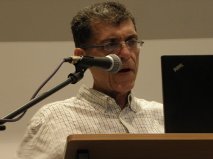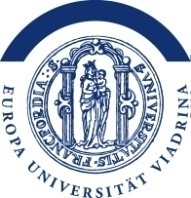Languages are tools for destroying and building barriers at the same time
International workshop at the European University Viadrina organized by the Faculty of Social and Cultural Sciences



Social, national and ethnic barriers are built on behalf of the language and since the 19th century people are assigned to obstinate ethnic and national categories. Barriers and the division of languages result in cultural clashes and conflicts all around the world. How is it possible to overcome it if one doesn’t even master the language of his neighbor? In the course of the international workshop on language as a tool for establishing long term barriers, scientists and linguists search for causes of this phenomenon and they provide the listeners with concepts of how to cross barriers present in countries, cities and neighborhoods, where different languages are spoken. One possible way is not to defame differences between a standard language and its diverse versions and to accept them as an equal part of the language. The Kiezdeutsch spoken by young immigrants in the district of Berlin, Kreuzberg can serve here as an example. Heike Wiese, a scientist from the University Potsdam, argues that this language is not wrong or incorrect but it creates new language structures. Mrs. Wiese held a lecture on the topic „ Who owns a „dialect”? What can the public discourse on Kiezdeutsch tell us about the transfer of ethnic limitations into the linguistic aspects?“ One way to understand each other in such cases is to switch between different languages for example as in the triple border region between Paraguay, Brazil and Argentina. Prof. Luiz Paulo Moita-Lopes from Rio de Janeiro performed rap songs of music bands stemming from the border region written in three languages: Brazilian Portuguese, Spanish and Guarani.
„Como a linguagem foi modelada pelas pessoas hoje em dia“
Portuguese

Prof. Luiz Paulo Moita- Lopes from the University Rio de Janeiro:
O tema écomo a linguagem foi modelada pelas pessoas hoje em dia. Existem pessoas que preferem se expressar com mais de uma língua simultaneamente. Talvez elas nem estejam cientes que estao usando outros idiomas, é apenas uma forma de se comunicar. Há um mes atras eu estava em Praga e precisava alugar um carro. Pedi informacao pra uma mulher que falava ingles muito bem. Por algum motivo, ela nao podia me dizer onde eu poderia ir. Um homem que estava por perto, ouviu nossa conversa e entendeu o que eu queria, entao ele apontou para o Shopping e disse “Drei Ettage”. Eu acredito que ele nao tenha notado que estava falando alemao e frances ao mesmo tempo, apenas disse as palavras pra que eu pudesse entender para onde me dirigir.
Author Amanda Ferreira
Editor Mila Zaharieva-Schmolke
Moderated by Amanda Ferreira, Anna Stopazzolo and Anna Lewandowska
http://www.kuwi.europa-uni.de/de/lehrstuhl/sw/sw1/Tagung-2013/index.html


